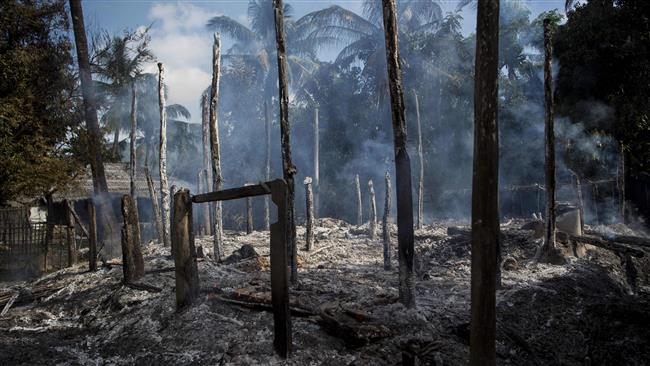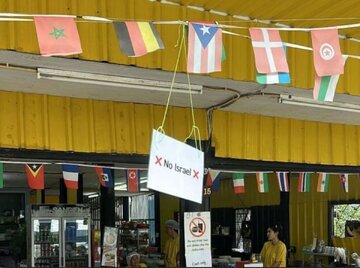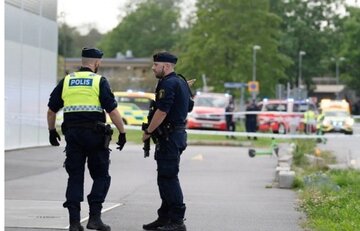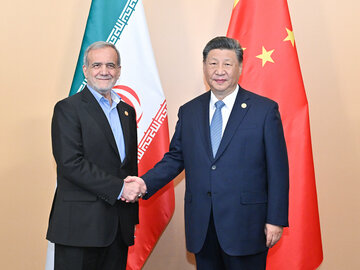(AhlulBayt News Agency) - In the capital, demonstrators gathered in front of the presidential palace and Myanmar embassy carrying banners saying "Save the Rohingya Muslims”, "Myanmar, Stop Muslim Cleansing!” and "Stop Genocide against Rohingya.”
Over the past six weeks, rights groups have expressed concern over reports of killings, rapes, arbitrary arrests and other violations in villages predominantly occupied by Rohingya in Myanmar’s troubled Rakhine State amid military operations launched after fatal attacks on police stations Oct. 9.
They have called for independent investigations into the initial attacks, ongoing operations and reported rights abuses in the area, which has been under military lockdown ever since.
Dian Hardiana, a coordinator of the protest in Bandung City in West Java, said Thursday that even though they live in a different country, Indonesian citizens have great empathy toward the stateless Rohingya.
"Although geographically separated, our hearts are one. Because in fact, fellow Muslims are brothers," Hardiana was quoted as saying by detik.com.
Several organizations -- including Big Family of Islamic Unity, commonly known as Persis -- joined the gathering, carrying posters reading "Save Rohingya, Cut Diplomatic Relations between Indonesia and Myanmar”, "Revoke Aung San Suu Kyi's Nobel” and "Drag Myanmar to the Human Rights Court”.
Protesters called for the Myanmar military’s leaders and all parties accused of violations against Rohingya to be brought before international courts in The Hague.
They also urged international bodies -- such as the Association of Southeast Asian Nations, or ASEAN, the United Nations and the Organization of Islamic Cooperation -- to protect the Rohingya community and uphold their rights.
On Wednesday, Foreign Ministry spokesman Arrmanatha Natsir expressed Indonesia’s hopes that the Myanmar government would be able to restore calm to the country soon.
"We also emphasize the protection of human rights to all communities, including the Islamic minority in Rakhine," he said in a statement quoted by kompas.com.
Rohingya groups, however, claim that the number of civilians killed in one weekend alone earlier this month could be as high as 150.
On Monday, the government said that at least 430 people have also been detained for alleged involvement in the initial attacks, along with subsequent alleged attacks on military conducting clearance operations in the area.
There has been no independent verification.
The UN's Office for the Coordination of Humanitarian Affairs announced Saturday that up to 30,000 people have now been displaced by the ongoing violence.
State Counselor Aung San Suu Kyi’s office has announced a national-level investigation commission will soon be formed to probe ongoing attacks in Maungdaw Township.
"The commission will submit a report based on its findings in the investigation and will also give suggestions for the prevention of such kind of attacks in the future,” the state-run Global News Light of Myanmar newspaper reported earlier this week.
On Friday, protests against the persecution of Rohingya are set to be held in the capitals of Indonesia, Malaysia and Thailand following the Muslim mid-day prayer.
On Wednesday, Malaysian Youth & Sports Minister Khairy Jamaludin said he had lobbied for his country’s football team to boycott an international tournament co-hosted by Myanmar in protest at the crackdown in Rohingya Muslim areas.
A law passed in Myanmar in 1982 denied Rohingya — many of whom have lived in Myanmar for generations — citizenship, making them stateless.
The law denies the Rohingya rights to Myanmar nationality, removes their freedom of movement, access to education and services, and allows arbitrary confiscation of property.
Myanmar nationalists have since taken to referring to the Rohingya -- which the UN calls one of the most persecuted people in the world -- as Bengali, which suggests they are not Myanmar nationals but interlopers from neighboring Bangladesh.
/106





